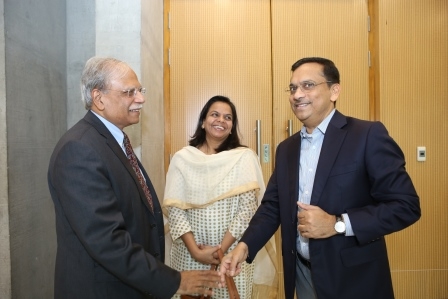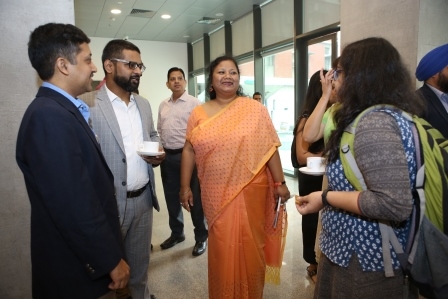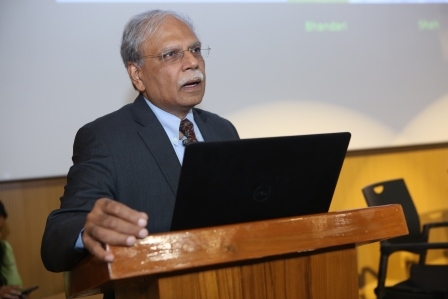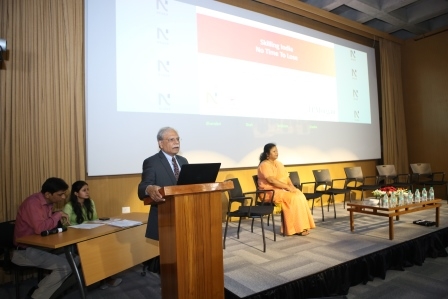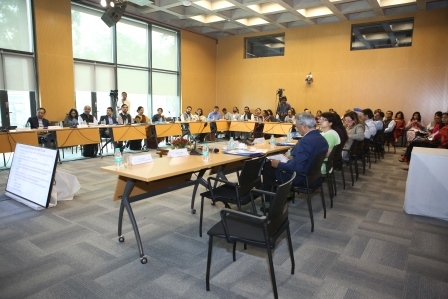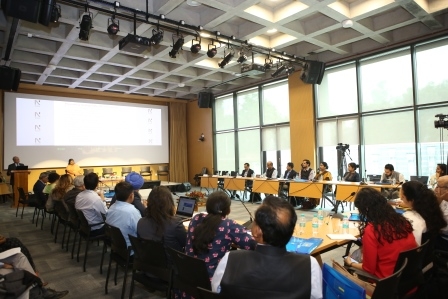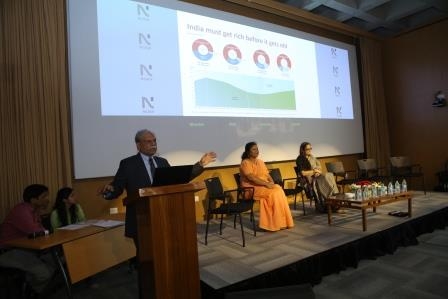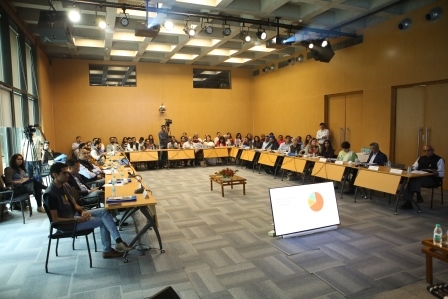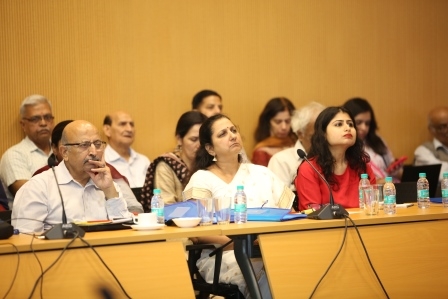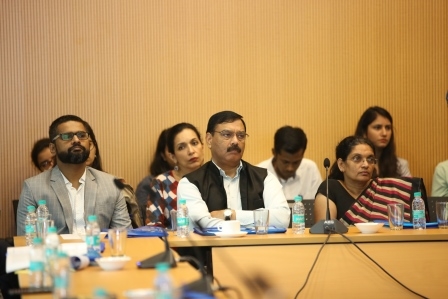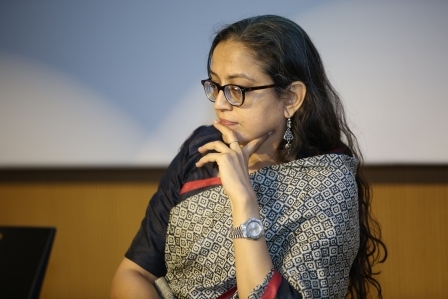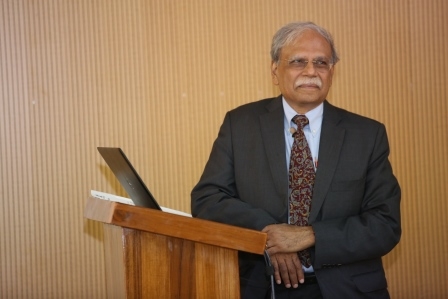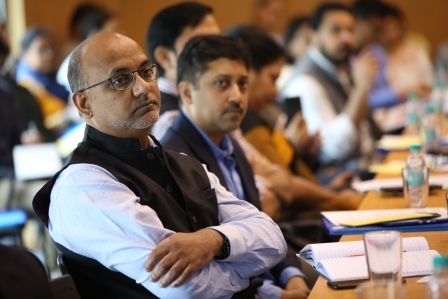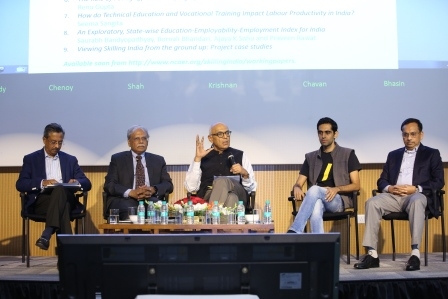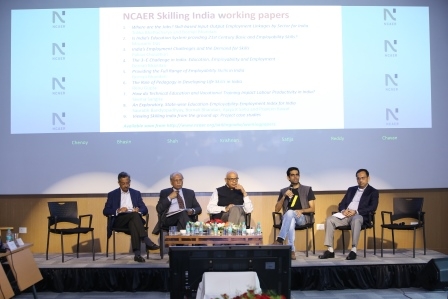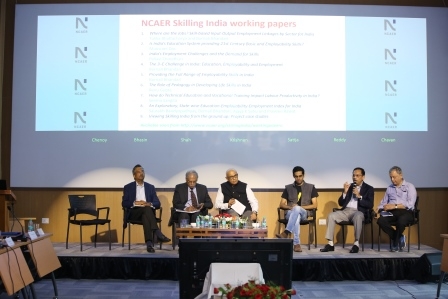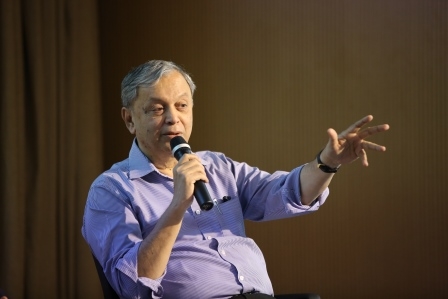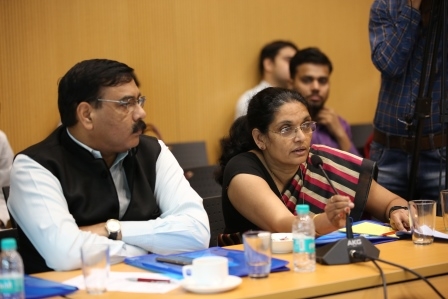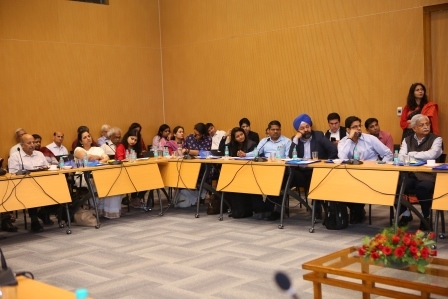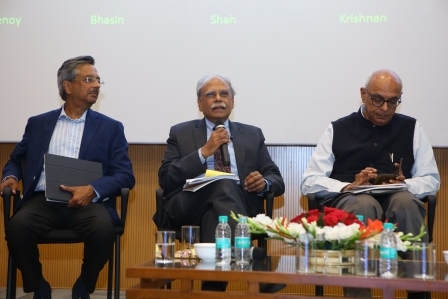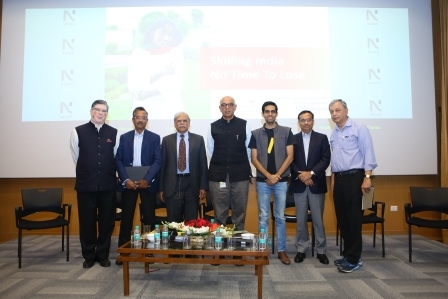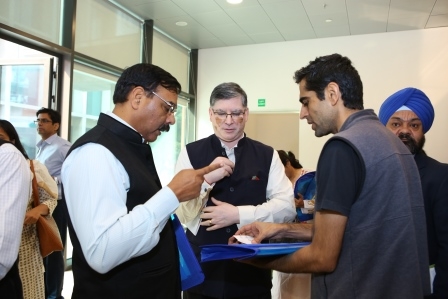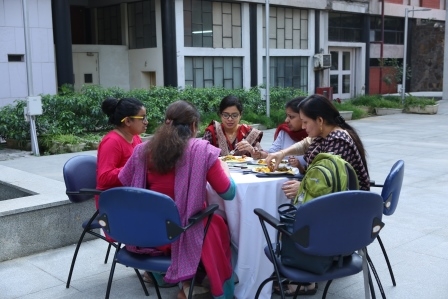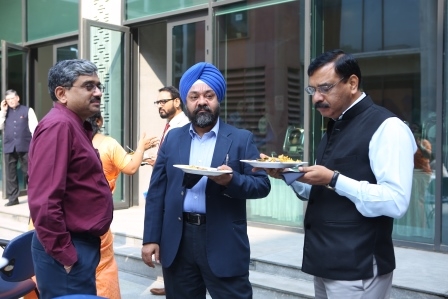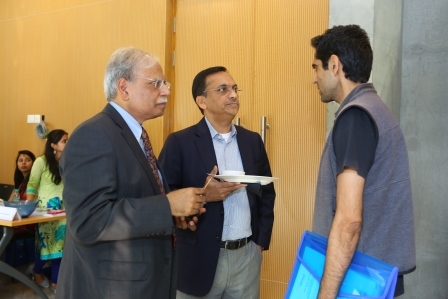NCAER released a new Report, Skilling India: No Time to Lose, at an event inaugurated by Dr K P Krishnan, Secretary, Ministry of Skill Development and Entrepreneurship. The Report puts forward the key findings of a research project on skills and jobs that NCAER started in 2016 with support from a research grant from J.P. Morgan. The event was held in NCAER’s new T2 Conference Centre.
The Report urges extreme urgency in dealing with India’s vicious cycle of poor skilling and not enough good jobs if India is to avoid a jobs crisis. Indians must move from lifetime employment to lifetime employability, but much remains to be done on the supply and demand side of skills to get there. Attention must be paid to the acquisition of skills, the matching of skills and the anticipation of skills. The Presentation on Skilling India Report delivered by Dr Shekhar Shah, is available here.
While delivering the keynote remarks at the launch of the Report, Dr K P Krishnan, complimented NCAER for its sharp and insightful study addressing one of the biggest hurdles facing policymakers today. He said, “The NCAER report can also fulfil the need for addressing information asymmetry and creating a high-quality micro and macro labour market system in dealing with the skilling challenges being faced by the country. Another challenge is to create a consolidated regulatory system which brings together the currently fragmented skilling system at the Union level rather than through the functioning of multiple agencies. The goal is to bring down government regulation in private institutions in the skilling and educational ecosystem.”
Maneesha Chadha, Head-Philanthropy Initiates, India. J. P. Morgan thanked NCAER for the report which she said offers incredible insight to industry, policy makers as well as funding agencies and will help them channelize funds for impact. She further said that the report will help in thinking in a more structured way on what should be done in the field of Skills, in future.
The Report points out that policymakers in India face the triple challenge of simultaneously (i) promoting the creation of more well-paying jobs, including for women; (ii) creating and regulating efficient pathways for skill acquisition and job matching to ensure workers have the right skills and employers find the right workers; and (iii) protecting the vast numbers of low-paid, informal, low-skilled workers with social protection benefits as they try to transition into better jobs. India appears to be caught in a vicious cycle of poor skilling, informality, and few good jobs. An additional challenge comes from the massive number of workers aged 30–59 who are in the workforce or coming into it, but have to be reskilled or up-skilled. And a final challenge from the changing nature of work with technical change accelerating and fundamentally altering manufacturing and services processes.
The Report notes that it is possible to move from this vicious cycle to a self- reinforcing virtuous circle of better skilling and good jobs, but it will not be easy. After suggesting simpler ways of thinking about the three types of skills that are fundamental— foundational, employability and entrepreneurial— the Report offers a three-part framework of acquiring, matching, and anticipating skills that can allow policymakers and practitioners to design, execute and evaluate skilling pathways that can help break the cycle of poor skilling and the slow creation of good jobs. The triad of acquiring, matching and anticipating skills must work together, which has not been the case in many schemes both in the public and the private sectors.
The event was attended by a distinguished gathering of researchers, policymakers, participants from academic foundations, industry and the media. A panel discussion on ‘How to Win the Race to Skill India?’ moderated by Dr Krishnan brought forward the views of Madhav Chavan, Pratham, Pramod Bhasin, Genpact, Atul Satija, Nudge Foundation, R C M Reddy, IL&FS and Dilip Chenoy, FICCI.
Dr Bornali Bhandari, Fellow at NCAER and the team leader of the NCAER skills team that did this work said that, “the novelty of the report is on the framework that it offers to policymakers – skills that are acquired in schools can be matched to what is needed in the job market and which in turn helps people to acquire more skills that are anticipated in the future. The Government can strengthen the supply side while keeping their eye on the demand side of skills.
Dr Shekhar Shah, Director-General, NCAER, noted in his opening remarks that, “India’s economy is on the move, but our workforce has hardly budged. India’s skilling paradox is that the labour market is characterised by dwindling opportunities in agriculture, there is much potential for jobs in manufacturing and services, but there are not enough people with the right skills, even for today’s jobs. As the NCAER Report quotes, while IBM has more employees in India than in the US, ever more Indians are struggling to find work. And while India grapples with the legacy of its skills-jobs mismatch and the long neglect of its K-12 schooling, it must pay attention to anticipating the skills of tomorrow, when it is sometimes not even clear what those skills will be. Moving from the current vicious cycle of poor skilling and few good jobs to a virtuous circle of better skilling and many more good jobs is possible, but will not be easy. It will require all stakeholders in the skilling ecosystem—employers, workers, governments, and skill providers—to work together to acquire and impart skills, to match and adjust, and to anticipate and adapt the skills that India will need in the next three decades. ”
Shah further said that “We need a 15-year perspective programme focused on transferable skills that can meet the demand from industries now and in the future. We must change the rules of the game and shift mind-sets everywhere from lifetime employment to lifetime employability. To prepare such a program, the Government should establish a Commission for 21st Century Skills. This NCAER Report could provide a framework for the terms of reference for such a Commission.”
What does the new NCAER Report say? A more detailed view
India has a skilling paradox
Dwindling opportunities in agriculture, much potential for jobs in manufacturing and services, but not enough people with the right skills.
Many of India’s roughly 468 million workers have to move from ‘baskets’ to ‘bytes’
The transition of India’s labour force from small, unregistered firms in the informal sectors to small, medium and large formal firms has been slow. Rigid labour laws and poor infrastructure impede the pace of transition from informal to formal jobs.
India is trapped in a vicious cycle of low skills and few good jobs
The combination of inadequately skilled workers, out-of-date labour laws, a rising ratio of wages to the price of capital and persistent informality are feeding on each other—a self-perpetuating vicious cycle that results in fewer good formal jobs than India is capable of and badly needs. Greater informality drives poor skilling, employers choose machinery over men, and few good jobs are created, driving India’s burgeoning labour force further into informality.
Moving to a virtuous circle of better skilling and more good jobs is possible, but hard, and India’s demography leaves no time to lose
A three pronged approach is needed. First, clear policy distortions in labour and industrial laws and regulations. Second, promote investments in those sectors identified as the most promising in generating jobs directly within that sector and indirectly across sectors. Third, skill the workforce such that they match employers’ needs. In skilling, particularly look for opportunities to skill workers as close to their likely jobs destination so that the matching and anticipating of skills is that much easier.
The NCAER Report recommends simplifying skill definitions to make it easier to see what’s needed
The starting point has to be a simpler conceptualisation of skills, getting away from the fragmentation and the complexity of a vast skilling industry in India that has scale but lacks overall direction and a strategy for the future. The Report considers three types of skills and their combinations in varying proportions. Cognitive skills are basic skills of literacy and numeracy, applied knowledge and problem-solving aptitudes and higher cognitive skills such as experimentation, reasoning and creativity. Technical and vocational skills are the physical and mental ability to perform specific tasks using tools and methods in any occupation. Social and behavioural skills include working well with others, communicating well with others, listening well to others and generally being agreeable and outgoing. Everyone has these skills to varying degree. Combining these types of skills gives foundational skills, employability skills and entrepreneurial skills.
The NCAER Report recommends a three-part framework—acquiring, matching, and anticipating skills—for thinking about how to make India’s skilling ecosystem work better. This triad must be integrated into almost all policies and programmes and used to evaluate their utility and impact.
Acquiring, imparting and assessing skills—requires change in K-12 education, vocational and technical education and on-the-job training. Required on the supply side of workers providing skills are essential changes in India’s schooling and skilling system—the world’s largest—in vocational education and in on-the-job training. This also requires recognising and certifying the skills and prior learning of those in the informal workforce. Not only does the overall quality of schooling and training have to rise, but the content has to address the workplaces of today—and tomorrow. General education should impart social and behavioural skills as well as basic and higher-order cognitive skills, problem solving and systems thinking. Vocational education should develop and revise programmes nimbly to keep up with workplace demands. On-the-job training should extend beyond large firms and should be offered to workers in smaller firms and to informal workers.
Key policy implications are:
- Make sure all children are literate and numerate by using remedial teaching, technology and improving teacher professionalism
- Improve adult literacy and numeracy programs and converge them with vocational skilling programs
- Make changes in curricula and teaching practices in the Indian education system
- Ramp up assessments to know whether and what skills are imparted with what success
- Adopt international learning standards
- Consolidate technical and vocational education in line with the recommendations of the Prasad Committee report
- Reach out to entrepreneurs, skill informal workers and skill workers for lifelong learning
- Ensure that skills are portable across other jobs and sectors
Matching and adjusting skills— on the demand side of employers looking for skills—requires knowing how job seekers with low skills or high skills can find productive work and how firms can find workers with the general and specialised skills they need to prosper and grow. Education and skilling systems should emphasise transferable foundational and life skills, because seasonal industries and ever-changing work require skill sets that will empower workers over the life of their careers and enable them to multitask within industries and to switch across industries. Women need to enter the workplace more widely and move from low-skill jobs towards high-skill digital and management jobs.
Key policy implications are:
- Up-skill women, provide life skills and mentor them as critical to improving their labour force participation and improving their employability.
- Formalise informal workers by recognising prior learning
- Encourage migration by skilling rural workers by not just providing them technical and vocational skills but also non-cognitive skills of survival in environments away from home
- Encourage opportunity entrepreneurs: provide necessity entrepreneurs with digital and financial literacy skills to help convert them into opportunity entrepreneurs. Entrepreneurs need system skills and resource management skills. They also need advanced non-cognitive skills such as instructing and negotiating. India’s higher education system does not equip students with these skills.
Anticipating and adapting skills requires understanding how structural and technological changes in this 21st century are radically altering today’s workplace and the nature of work. While India must deal with its backlog of unskilled, informal workers, it must also not forget to provide for its future if rapid progress is to be sustained. Firms of different sizes are already placing different skill requirements on individuals—large firms need formal business and accounting skills and high technological skills, and smaller firms need multitasking and adaptability to business practises. The 21st century jobs will no longer be confined to task-specific roles. Instead, the demand for multidimensional skills will increasingly grow. Customer facing jobs with non‑routine interactive tasks that depend on soft skills can be expected to grow. So can jobs depending on higher cognitive skills. The 21st century Indian worker will need transferable skills. India needs to create an agile workforce that can anticipate and adapt to changes in technology, automation and digitisation.
Key policy implications are:
- Prepare a 15-year perspective programme focused on transferable skills that can meet demand from industries now and in the future. To prepare the program the government should establish a Commission for 21st Century Skills.
- Improve the investment climate and ease of doing business
- Connect private and public stakeholders better
- Institutionalise flexible social security: India needs a trinity of unemployment benefits, old-age pensions and health benefits so that a flexible labour market may be created.
- Focus on quality and inclusion: India’s education and training systems need to change as quickly as possible to focus on quality, adaptability and learning outcomes. They need to be mapped to learning outcomes through a National Qualifications Framework so that the education system is adequately geared towards preparing future workers for the ever-changing world of work.
- Prepare for the new face of manufacturing: Tech and soft skills, both higher cognitive and non-cognitive, will be required for enhancing employability in Industrial Revolution 4.0.
- Commission regular, skills-related labour market research on an ongoing basis
If in the next five years India can successfully create the self-reinforcing virtuous circle of acquiring-matching-anticipating skills as suggested in the Report, and, in parallel, create the economic and social conditions for rapid, sustained economic growth, there is no reason why India’s aspirations to become an economic superpower cannot be realised, providing opportunity and well-being to millions of its citizens across the country, men and women, young and old.


 Events
Events 